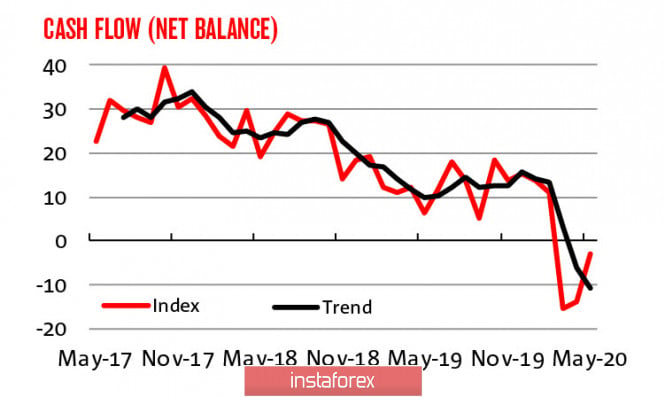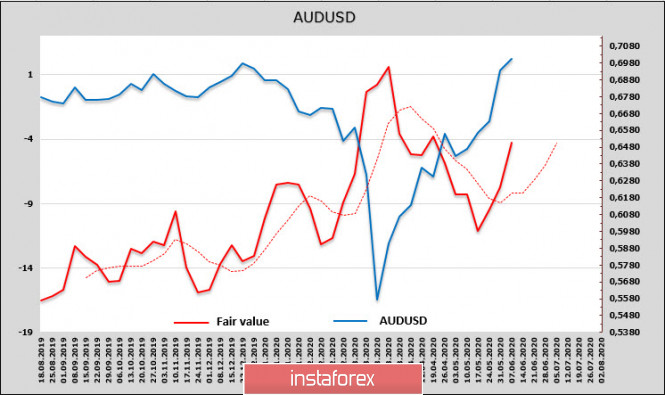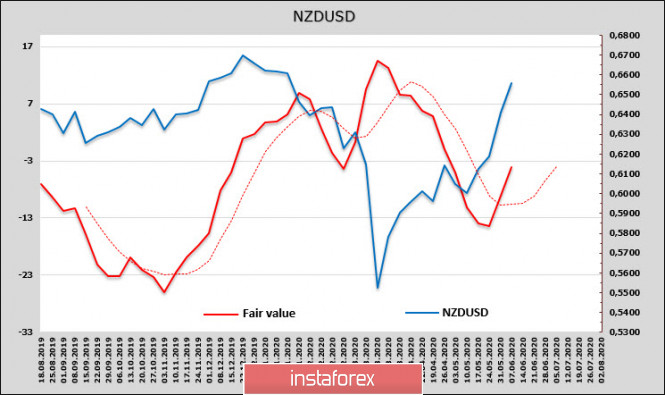Dominance of positive sentiment in global markets continues. On Monday, US stock indices incurred gains. Nasdaq Composite and S&P 500 returned to annual highs. The markets are still under the influence of the extremely positive US labor market report. In addition, the liquidity supply from the majority of the central banks is growing.
Oil prices exceeded $40 per barrel and slowed download growth. However, the trend remains positive as measures taken by OPEC + are giving results. The US dollar is losing ground amid positive expectations. On Tuesday, there is no reason to wait for changes in current trends. The publication of the NFIB report for May is likely to add volatility.
AUDUSD
According to the results of a monthly business survey from National Australia Bank, business conditions in May improved significantly compared to March and April. However, the reading still remains very negative. The key parameters are at the levels that were last observed during the recession of 1990. Every single industry expects worsening conditions, the employment and investment indexes do not show growth. Thus, business has not yet seen any conditions for the expansion or recovery of activity levels of the pre-virus period.
Capacity utilization increased slightly. However, the current level remains very low. Moreover, there are no signs of export growth, while consumer activity is also at its lowest levels. Capital flows are expected to be in a downward trend which began long before the COVID-19 pandemic. Negative tendencies have accumulated over the years. Therefore, it will be impossible to blame them on the coronavirus.

China's foreign trade data for May, published at the beginning of the week, turned out to be worse than expected, especially for imports, which fell by 16.7%. Of course, part of this decline is offset by low commodity prices. However, the threat of a slowdown in import volumes remains high. This is likely to have a negative impact on Australia's export estimate at least until the June report.
According to CFTC's weekly report, the net short position on the Australian dollar increased by $116 million on a weekly basis. Therefore, growth in the estimated fair price is not based on fundamental indicators, but on positive expectations and an increase in demand for risk assets.

The AUDUSD pair starts testing important resistance at 0.7025. Based on short-term trends, the testing is expected to be successful and the Australian dollar is likely to rise and consolidate above the level of 0.7080. As a result, an upward trend may occur. At the same time, based on the fundamental state of the Australian economy, there are no special reasons for growth. Therefore, a local peak may form in the 0.7025/80 zone, while a breakout of the resistance level may be false.
NZDUSD
The New Zealand dollar continues to be a leader in terms of market growth. Over the weekend, the currency received a new batch of positivity as Prime Minister Ardern had announced the transition to the first level of alert meaning the removal of all restrictions on social distancing and public events.
Consequently, the next step will be tourism growth, one of the most important components of New Zealand's economy. Expectations of open borders will support the qiwi, regardless of whether the wave of positivity covers the global economy or not.
Speculators have reduced their net short position on NZD once againg. The trend is positive. The estimated price lags behind the spot price, but is directed upwards. Thus, the main scenario for qiwi is growth.

The resistance level of 0.6448 turned into support. The next support zone is seen at 0.6320/30, where in case of a pullback, buy deals are likely to resume. It is preferable to hold long positions. As for new buy deals, the formation of a technical signal is necessary which is likely to appear only after a correctional decline.
The material has been provided by InstaForex Company - www.instaforex.com